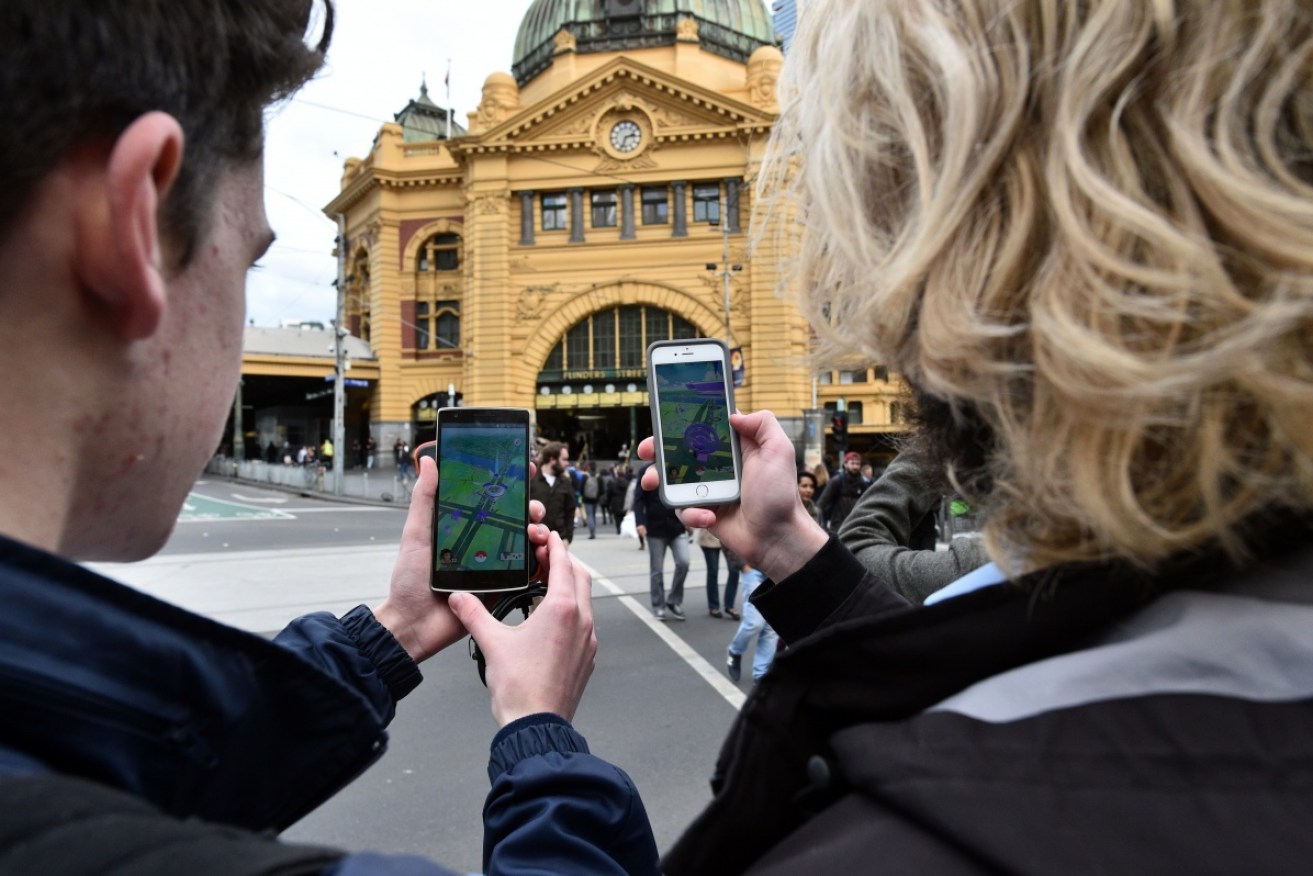The conspiracy theory freaking out Pokemon Go players

AAP
Millions of Pokemon Go players are unwitting pawns in a global surveillance project with links to the CIA and Google, conspiracy theorists and tech experts are claiming.
Pokemon Go is an augmented-reality smartphone game that forces players to follow Google Maps to collect monsters known as Pokemon.
The game took the world by storm when released last week and has added $9 billion to Nintendo’s share price, the firm that created the Pokemon brand.
But fears have emerged that Pokemon Go is an elaborate ploy to spy on millions of people.
• Pokemon Go just took a sinister turn
• CBD streets shut for Pokemon Go
• Big step for iPhone texting
On Tuesday (AEST), US news website Gawker alleged the game’s creator, Niantec, was linked to the CIA. This followed reports spawned by blogger Adam Reeve claiming Pokemon Go commanded a list of intrusive tracking permissions for gameplay.
John Hanke is Niantec’s CEO. He created software called Keyhole in 2001 and Gawker based much of its theory on Mr Hanke’s business dealings.
Keyhole was funded by a CIA venture capital firm. Most of the money used to fund Keyhole came from the National Geospatial-Intelligence Agency (NGA).
The NGA’s primary function is “collecting, analysing, and distributing geospatial intelligence”.
Keyhole was then purchased by Google and became Google Earth. Google Earth helps power Pokemon Go.
Then, this passage in Pokemon Go‘s privacy policy sent internet conspiracy theorists buzzing.
It read: “We may disclose any information about you (or your authorised child) that is in our possession or control to government or law enforcement officials or private parties.”
Pokemon Go tracked users‘ location, phone storage, Google account information (if you’ve joined that way), camera, contacts and activity recognition – among other access requests – so people began panicking.
Niantec has since admitted it did not intend for this to happen. It said it was fixing the problem.
But a Reddit user dubbed fight_for_anything alleged governments and security firms could use Pokemon Go to launch surveillance or gather intelligence inside private buildings.
Pokemon Go players use their phone cameras to view Pokemon in public.
Players are lured into these places, and into using their camera in private properties, by having Pokemon appear there.
“If you are an intel agency and you want photos of the inside of a home or business, you just spawn desirable Pokemon or related objects there, and let totally unaware and distracted citizens take the photos for you,” fight_for_anything wrote.
Pokemon Go ‘deadly’
As Australian police warned Pokemon Go players to be cautious while walking the streets with their heads buried in phones, a safety expert gave a dire appraisal.

High school students play the game in Melbourne. Photo: AAP
“Potentially it is fatal,” security and safety systems expert Dr Tony Zalewski told The New Daily. “That’s on top of serious slips, trips and falls.
“If someone was to step inadvertently onto a roadway, they’re exposed to vehicles and bikes on the roadway that is certainly exposing yourself to a range of grave physical harm by playing the game.”
Worker sacked over Pokemon Go
An Australian man who complained about Pokemon Go not being available in Singapore has been sacked, according to the BBC.
Sonny Truyen launched a profanity-heavy rant on Facebook, and his employer, online property broker 99.co, sacked him after seeing the post.
The company apologised in a blog post: “We are a proud Singaporean company and do not condone such language or behaviour.”
Pokemon Go ‘took over my house’
Another potential privacy problem with Pokemon Go has been how it chooses buildings as locations for gameplay.
Boon Sheridan, from Massachusetts in the United States, explained how his house had been surrounded because it was a “gym”, or place for people to battle with Pokemon.
This is what I’m a little leery of. People pulled up, blocking my drive way as they sit on their phones. pic.twitter.com/WpRbilk6g6
— Boon Sheridan (@boonerang) July 10, 2016
“Living in an old church means many things,” Mr Sheridan posted to Twitter. “Today it means my house is a Pokemon Go gym. This should be fascinating.”
He said he watched wearily as “people pulled up, blocking my drive way as they sit on their phones”.
Mr Sheridan has contacted game creator Niantic to see what he can do about the problem, but joked he was not angry or mad at those turning up to his house.








